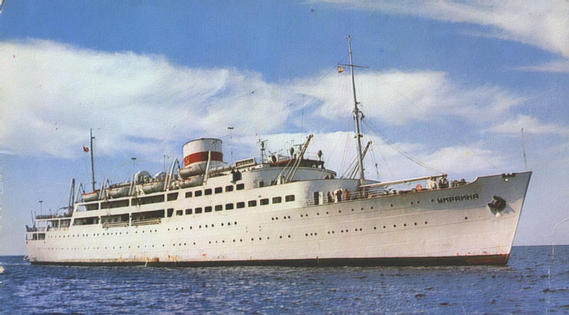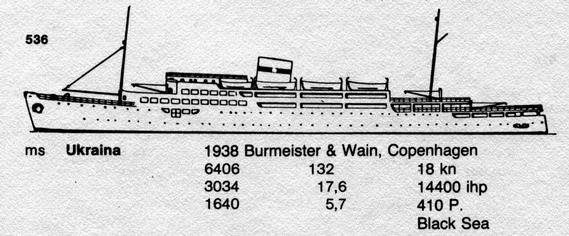M.S. UKRAINA
Black Sea Shipping Company (BLASCO)
Soviet Union, Ukraine
Eclair-Kazan, Lebanon,
postcard.
Built: 1938 by Burmeister and Wain, Copenhagen, Denmark.
Technical:
Overall length: 132 m Beam: 17.6 m Draft: 5.7 m Gross Tonnage: 6406 tons Passengers: 410 Power: 2 Burmeister & Wain diesels, 14400 HP Service Speed: 18 knots Operating Routes: Mostly Black Sea, Mediterranean and African ports, with cruises
in the Eastern and Western Mediterranean and Europe. Sister Ships: M.S. Transilvania
(NAVROM,
Romania) Former Names: M.S. Basarabia (NAVROM,
Romania) Later Names: None History and Current Status: As M.S. Basarabia of
Navrom, she operated as a liner in the Constanza-Alexandria route, with
occasional cruises in the Mediterranean, Adriatic, Aegean and Black Sea,
together with her sister M.S. Transilvania. For
many years, they were the fastest ships servicing the Mediterranean. During
World War 2, they were laid up in Istanbul,
Turkey. In 1948, she got transferred to the Soviet Union as a war reparation,
renamed M.S. Ukraina and under the hammer and sickle of BLASCO, she served as a liner in the
Black Sea, Eastern Mediterranean and African routes. Later, she was used
in Mediterranean cruises. She was scrapped in 1988 as a result of a policy that
required old Soviet vessels to be taken out of the service because of
repetitive accidents. Here is an excerpt about her sister, M.S. Transilvania, from the book "Passenger Liners" by Laurence Dunn,
kindly provided to me by Michelle
Linder, curator of the Australian National
Maritime Museum: "Transilvania originally carried 80 first, 100 second and 230 third class passengers. These were housed in the superstructure and 2 continuous decks, below which were 4 holds, these served by electric cranes as well as
derricks. The main first class public rooms were arranged beneath the bridge, the music and smoke rooms being on the promenade and the dining saloon on the upper deck. Special features of the cabin accommodation were 2 large
deluxe suites on the boat deck. First class and deluxe cabins occupied the
after part of the promenade deck and lower forward extension of the
superstructure."
(email all info about her to ata.bilgili@dartmouth.edu) Notes: M.S. Ukraina: the great ghost ship!... I remember seeing her only 3-4 times in late 70's
and early 80's. She always showed up as a ghost ship, appearing without any warning in the middle of nowhere, disappearing
in the same way as she appeared. A 50 year old vessel when she got scrapped in 1988, she was a living example of how class
and beauty could be achieved with simple lines. Look at that round funnel, look at the beauty in the absence of a main
navigational mast, look at those thin aft biased cargo masts, look at that beautiful wooden wheelhouse, nicely sitting on
top of a steel superstructure!... Need I say more?... Thanks to my close friend and ship enthusiast Senih Onur, I own
this beautiful postcard of her, with clouds nicely ornamenting the background in a calm sea. Let's have a toast for a long
gone lady, shall we?
Links: Line Drawings:From the book "Soviet Bloc Merchant Ships" by
Bruno Bock and Klaus Bock, 1981. Other Pictures:
- 1938-1948: Navrom, Constanza, Romania.
- 1948-1988: Black Sea Shipping Company (BLASCO), Odessa, Soviet Union.
- 1988: Scrapped.


